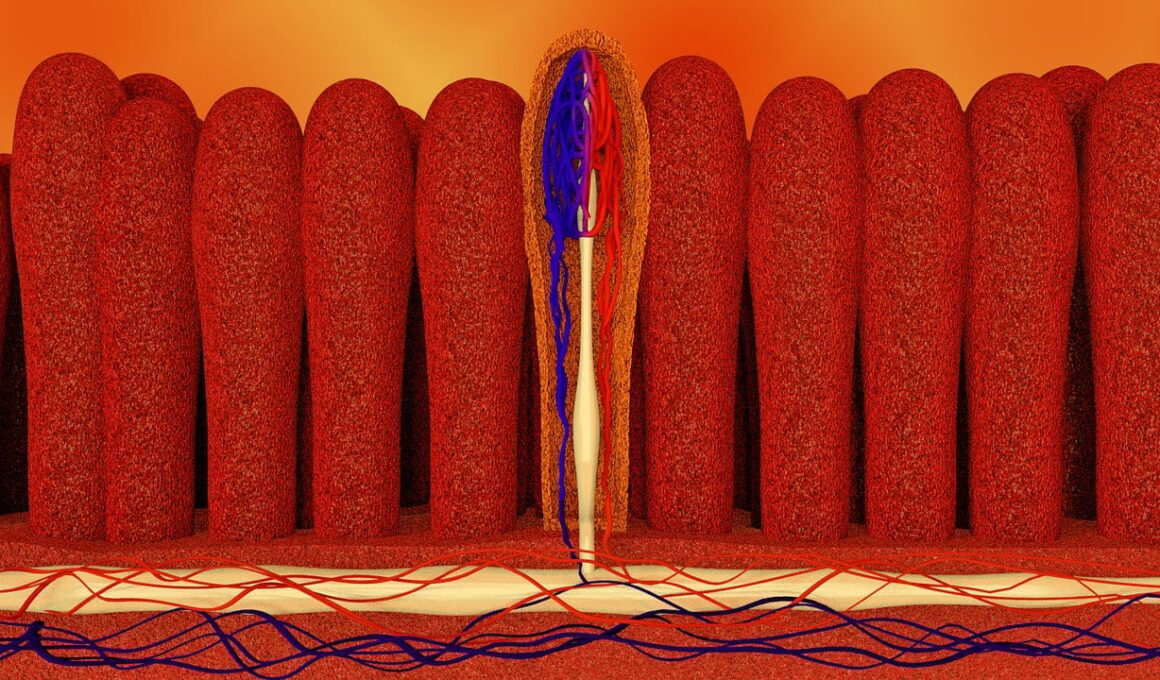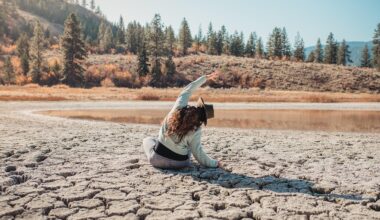Exercise and Gut Health: Implications for Immunity in Aging
As individuals age, maintaining a well-functioning immune system becomes increasingly crucial. Understanding the relationship between exercise, gut health, and immunity is vital for those navigating the aging process. Emerging research indicates that physical activity positively influences gut microbiota, thereby enhancing immune responses. Regular exercise promotes microbial diversity within the gut, which is associated with better health outcomes. Increased microbial diversity helps stave off infections and reduces systemic inflammation, a common issue in aging individuals. Yet, it’s essential to specify that not all forms of exercise yield the same benefits. Aerobic exercises like walking, running, or cycling appear particularly effective in fostering gut health. Furthermore, resistance training can also play a role in maintaining muscle mass and supporting immune function. Those interested in amplifying these benefits should focus on incorporating a blend of aerobic and resistance training into their routines. Finding enjoyable activities may help improve adherence to an exercise regimen, which is fundamental for achieving long-term results. Overall, physical activity represents a multifaceted approach to bolstering immunity through gut health, especially for aging populations.
The aging process often leads to a decline in physical activity levels, which can exacerbate health issues. Reduced exercise can negatively impact gut health, negatively affecting the immune system function. Sedentary lifestyles are associated with reduced microbial diversity, which can lead to dysbiosis, contributing to inflammatory conditions. These changes underscore the importance of exercise as a means to reclaim gut health and, in turn, improve immunity. Engaging in regular physical activity can stimulate gut activities and promote beneficial bacteria. Additionally, nutrition plays a key role in this relationship. Consuming a balanced diet rich in fiber, fruits, and vegetables can further enhance exercise’s positive effects on gut health. Foods like yogurt, kimchi, and sauerkraut contain probiotics, which can complement the benefits of exercise. Suitable hydration also plays a significant role in the gut’s functionality, promoting digestion and nutrient absorption. Implementing these combined strategies can help enhance the broader health benefits that come with regular physical exercise. Understanding and prioritizing these factors are essential for optimizing immunity and ensuring fitness, promoting a healthy and active lifestyle while aging.
Link Between Gut Microbiota and Immunity
Gut microbiota significantly impact immune responses, making this relationship vital in aging. With aging, gut microbiome composition changes, impacting immune efficiency. Exercise acts as a potent modulator of these microbiota, fostering a healthier gut environment. Regular physical activity enhances the population of beneficial bacteria while decreasing pathogenic varieties. This shift contributes to a more robust immune system capable of tackling infectious threats. Gut health influences systemic inflammation, often heightened in older individuals due to changes in microbiota. By fostering a balanced microbiome, exercise helps lower this inflammation, leading to improved overall health. A well-functioning gut also supports the production of short-chain fatty acids, essential for immune regulation. These fatty acids have anti-inflammatory effects that can benefit aging bodies. Addressing gut health through exercise has implications for everything from controlling blood sugar levels to managing stress. Research suggests that regular exercise may even reduce the risk of chronic diseases associated with aging. Therefore, enhancing gut microbiota through exercise presents a promising approach to supporting immunity in aging.
Moreover, the relationship between exercise, gut health, and immunity extends beyond mere improvement in microbial composition. Many studies indicate that engaging in regular physical activity can positively affect the gut-brain axis, further influencing immune function. This communication network between the gut and brain suggests that a healthy gut can lead to better psychological well-being, which is crucial as individuals age. Psychological stress can compromise immune response, highlighting the importance of both physical and mental health in maintaining a robust immune system. Additionally, exercise has been shown to reduce anxiety and depression, both of which can have detrimental effects on immune functions. Balancing these elements enables a holistic approach to health and well-being among the elderly. Furthermore, outdoor activities can provide additional advantages, exposing individuals to Vitamin D from sunlight, which supports immune health. Engaging in community-based physical activities can also reduce feelings of isolation, hence supporting mental health. Each part of this multifaceted approach works together, promoting a healthy aging process. Thus, optimizing exercise regimens while taking mental well-being and external factors into account can profoundly impact immunity.
Physical Activity Recommendations
For older adults looking to optimize gut health and immunity, tailored physical activity recommendations can significantly aid health. Experts suggest that seniors should engage in moderate physical activity for at least 150 minutes per week, spread across several days. This can include brisk walking, swimming, or gardening, all activities that can be enjoyable and beneficial. Strength training exercises are also vital and should be incorporated at least two days per week. Building muscle strength can support mobility and overall quality of life. Additionally, flexibility and balance exercises, like yoga or tai chi, can help prevent falls and enhance overall health. It’s also recommended to integrate activities that promote social interaction, as having a support network can encourage consistent exercise habits. Always consult healthcare providers before starting any new exercise regimen, especially if there are underlying health issues or concerns. It may take time to observe the benefits of regular exercise, but persistence is key. Older adults can gradually increase activity levels and find enjoyable forms of exercises that suit personal preferences while significantly impacting immunity and gut health.
Furthermore, understanding the significance of personalized exercise plans is essential. Each individual’s health status, mobility, and preference should guide the creation of an exercise program. Tailored regimens ensure not only safety but also greater enthusiasm for participation. For instance, some might benefit more from group exercise classes, fostering social connections. Others might prefer solitary activities like hiking or home workouts that provide flexibility in scheduling. Incorporating a variety of activities can also help sustain engagement and mitigate monotony. Another critical aspect is monitoring progress. Keeping track of activity levels, how one feels afterward, and any changes in gut health can help adjust plans as necessary. Staying attuned to these factors can lead to more effective outcomes. Support from fitness professionals can be incredibly beneficial in developing and maintaining appropriate goals. This tailored approach also encourages individuals to explore various forms of exercise beyond traditional options. Furthermore, pairing physical activity with dietary changes focused on gut health can amplify results, emphasizing an integrated approach to fostering immunity as one ages. Ensuring all these components work harmoniously maximizes long-term health benefits.
The Future of Exercise and Aging Research
Looking forward, the intersection of exercise, gut health, and immunity in aging presents an exciting frontier for future research. More studies are necessary to elucidate the precise mechanisms through which exercise impacts gut microbiota and immune function. Investigating how specific types of exercise can lead to varying benefits for gut health could help tailor interventions more effectively. Moreover, research should consider diverse populations, focusing on the unique needs of different ethnicities, genders, and health conditions. Understanding the nuances of how aging interacts with exercise and dietary habits is vital in developing comprehensive health strategies. Collaborations between researchers, fitness professionals, and healthcare providers may yield promising results for older adults. In addition, the implications of technology in monitoring exercise regimens and gut health can offer innovative solutions. Wearable devices can track not only physical activity but also stress levels or sleep quality, integrating overall health insights. Enhancing public awareness about the critical role of physical activity in maintaining gut health and immunity could further promote proactive approaches to aging. Overall, investing in research and awareness will vitalize the pursuit of healthy aging through exercise.
In conclusion, exercise represents a fundamental pillar supporting gut health and immune function among aging populations. The evidence clearly illustrates that regular physical activity can promote beneficial changes in gut microbiota, enhancing the body’s capability to combat infections and reduce inflammatory responses. Together, these effects favor improved health and quality of life in older adults. To reap these rewards, individuals must adopt an active lifestyle, incorporating a combination of aerobic and resistance training activities tailored to their unique abilities and preferences. Integrating social interactions into physical activities promotes adherence, creating a supportive community. Furthermore, recognizing the role of nutrition enhances the capacity of exercise to promote gut health. Ultimately, collaboration between researchers, health professionals, and individuals will help further advance knowledge in this field. Investing in health and well-being through exercise and nutrition should be prioritized as essential components of aging gracefully. Therefore, harnessing the potential benefits of exercise holds immense promise, allowing aging individuals to lead vibrant, fulfilling lives, mitigating the challenges that often accompany the aging process.


